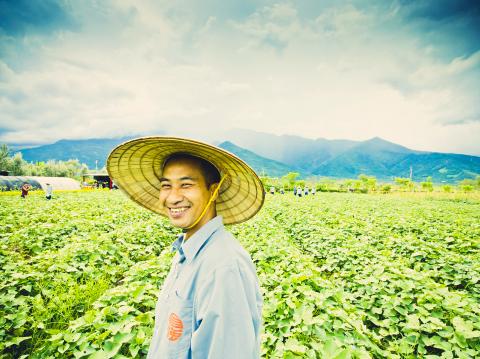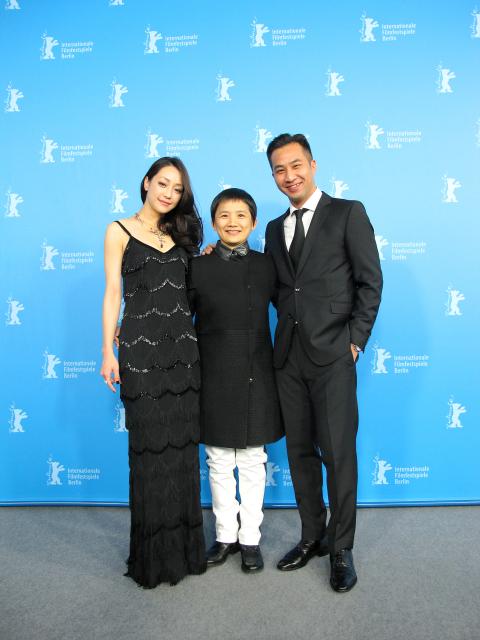Occupying a small corner of the recently refurbished Martin Gropius Bau art gallery in central Berlin, also the temporary headquarters for the city’s 64th Berlin film festival, a team of Taiwanese film industry heavy-weights and sales agents were busily engaging a stream of visitors.
The nine-strong group had a mission on their hands: to sell the political docu-drama and festival selected-film The Rice Bomber (白米炸彈客) to the world.
“I just hope that audiences in Berlin can see something different about Taiwan,” explained the film’s director Cho Li (卓立).

Photo courtesy of 1 Production Film Co / Ocean Deep Films
The Rice Bomber is certainly different. Based on the life of self-confessed bomb-maker Yang Ju-men (楊儒門) the two-hour film carefully unpicks the events leading up to his politically-motivated 12-month campaign of 2003-2004 during which he planted 17 small bombs, packed with rice, to highlight the hardships faced by struggling Taiwanese farmers.
After Taiwan joined the WTO to much pomp and ceremony in early 2002, Taiwanese farmers were then forced to compete in an increasingly competitive agricultural market. It was from this anxious and uncertain period that Yang emerged and seared his mark on Taiwanese history. While his bombs, the first of which bore the message: “Against rice importing — the government should look after its people,” never killed or injured anyone (in fact only two detonated), he was sentenced to seven-and-a-half years in jail in 2005. He was pardoned in 2007 after spending 16 months in jail.
“The Rice Bomber is the first film about the agricultural industry in Taiwan,” says Cho Li, her tiny frame dwarfed by the palatial and opulent hall of the once war-ravaged Martin Gropius Bau interior.

Photo: Taipei Times
“I am from Changhua, the same city as the rice bomber, and that’s one of the reasons I wanted to make this film. He planted those bombs in 2003-2004, but he had seen farmer’s hardship for more than 20 years by then,” she says.
For lead actor Jag Huang (黃健瑋), who also attended the festival, playing the man who has become part of modern-day Taiwanese folklore had its own challenges, many of them physical.
“Yang had been in an elite unit of the Taiwanese army and so he was strong,” says Huang, “and that meant I had to get into shape for the role … at one point I cycled all the way around Taiwan.”
Huang says he felt sympathy with Yang, whom he met in person, for the task.
“He didn’t use nails or anything, it wasn’t really violent. I think it was more like an announcement to create awareness.”
The film is, at times, a somewhat overly sentimental portrayal of Yang, with music designed to pluck at our heartstrings, and a cast of victimized characters, which robs the film of some of its political punch.
However, it is a brave attempt to tackle a controversial issue and the film cleverly uses newsreel footage and dialogues between Yang and his alter-ego to provide both context and insight. Taiwan also plays a leading role with High Definition film portraying Taipei, Changhua and coastal areas in a beautiful light.
The film ventures into further controversial territory with the portrayal of ‘trouble-maker,’ the young woman who became Yang’s friend and confidante. Despite rumors that ‘trouble-maker,’ played by Nikki Hsieh (謝欣穎), was the daughter of a wealthy and influential family, she espoused revolutionary theories and ideas that, as is shown in the film, she uses to both goad, inspire and dismiss Yang.
For Hsieh the role she played required plenty of personal innovation.
“I was aware that the character was based on someone real — she was tough but attractive and also confident. I had to find that in myself,” she said.
For Hsieh, recently seen in the films Make Up (命運化妝師) and Honey Pupu (消失打看), the film fulfills another role, which is to lift Taiwanese movies into new territory.
“We’ve had a lot of commercial films but this allows Taiwanese to see the problems society is facing.”
Tapping into the realities of Taiwan remain a source of inspiration for the film’s producers Yeh Ju-fen (葉如芬) and Lee Lieh (李烈) who helped steer the kitchen-based comedy Zone Pro Site (總舖師) to commercial success.
“Although Taiwan is a very small country, people there are full of life,” Yeh says, adding, “this is more and more apparent in our movies. Though Taiwanese film-makers may be young, they are creatively vibrant and that’s why the Taiwanese film industry is booming.”
After Yang received a presidential pardon in June 2007, he has turned his attention to promoting organic farming and locally-based farmers’ markets.
Actor Huang, having just watched the premiere in Berlin explained: “I was nervous about it all, but now I think I can see Yang again and say, ‘it was an accurate portrayal — I didn’t let you down.’”

In Taiwan there are two economies: the shiny high tech export economy epitomized by Taiwan Semiconductor Manufacturing Co (TSMC, 台積電) and its outsized effect on global supply chains, and the domestic economy, driven by construction and powered by flows of gravel, sand and government contracts. The latter supports the former: we can have an economy without TSMC, but we can’t have one without construction. The labor shortage has heavily impacted public construction in Taiwan. For example, the first phase of the MRT Wanda Line in Taipei, originally slated for next year, has been pushed back to 2027. The government

July 22 to July 28 The Love River’s (愛河) four-decade run as the host of Kaohsiung’s annual dragon boat races came to an abrupt end in 1971 — the once pristine waterway had become too polluted. The 1970 event was infamous for the putrid stench permeating the air, exacerbated by contestants splashing water and sludge onto the shore and even the onlookers. The relocation of the festivities officially marked the “death” of the river, whose condition had rapidly deteriorated during the previous decade. The myriad factories upstream were only partly to blame; as Kaohsiung’s population boomed in the 1960s, all household

Allegations of corruption against three heavyweight politicians from the three major parties are big in the news now. On Wednesday, prosecutors indicted Hsinchu County Commissioner Yang Wen-ke (楊文科) of the Chinese Nationalist Party (KMT), a judgment is expected this week in the case involving Hsinchu Mayor Ann Kao (高虹安) of the Taiwan People’s Party (TPP) and former deputy premier and Taoyuan Mayor Cheng Wen-tsan (鄭文燦) of the Democratic Progressive Party (DPP) is being held incommunicado in prison. Unlike the other two cases, Cheng’s case has generated considerable speculation, rumors, suspicions and conspiracy theories from both the pan-blue and pan-green camps.

Stepping inside Waley Art (水谷藝術) in Taipei’s historic Wanhua District (萬華區) one leaves the motorcycle growl and air-conditioner purr of the street and enters a very different sonic realm. Speakers hiss, machines whir and objects chime from all five floors of the shophouse-turned- contemporary art gallery (including the basement). “It’s a bit of a metaphor, the stacking of gallery floors is like the layering of sounds,” observes Australian conceptual artist Samuel Beilby, whose audio installation HZ & Machinic Paragenesis occupies the ground floor of the gallery space. He’s not wrong. Put ‘em in a Box (我們把它都裝在一個盒子裡), which runs until Aug. 18, invites